Full Band Bios!
The Revolutionary Snake Ensemble is a costumed funk/street beat improvisational brass band performing a unique blend of original and traditional music. Leader Ken Field is a longtime member of the modern music ensemble Birdsongs of the Mesozoic.
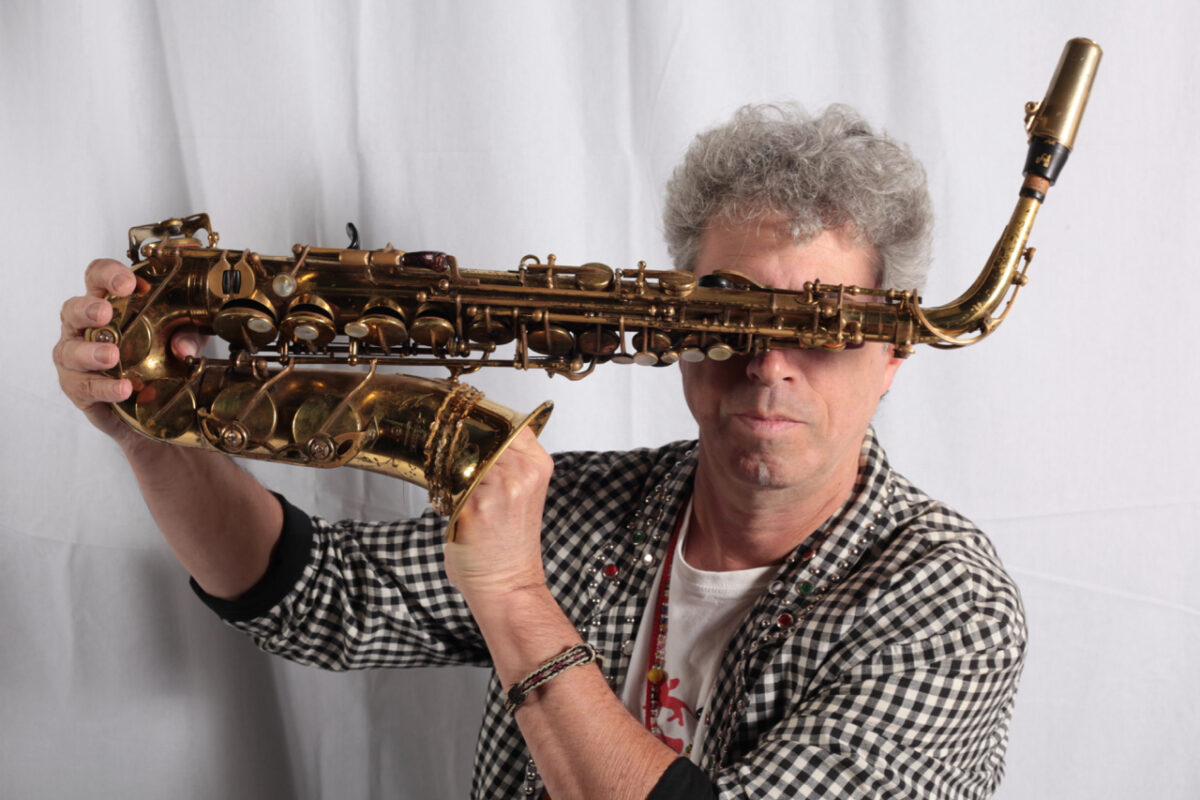
Band Member Bios: Ken Field
Ken Field is a saxophonist, flautist, and composer. Since 1988 he has been a member of the internationally acclaimed modern music ensemble Birdsongs of the Mesozoic, with whom he has recorded eight CDs. He leads the Revolutionary Snake Ensemble, an experimental & improvisational brass band. His solo releases document his work for layered saxophones and his soundtracks for dance and film. Field has performed for President Bill Clinton, with Trombone Shorty, Charles Neville, and former J. Geils frontman Peter Wolf, with the Jazz Composers Alliance Orchestra, and with the Georgia Symphony Orchestra.
Field has appeared throughout North America, Europe, and Asia, and has been awarded composition residency fellowship grants at the MacDowell Colony, the Ucross Foundation, the Fundación Valparaíso, and the Atlantic Center for the Arts. His musical projects have been featured in The New York Times, Saxophone Journal, Boston Globe, Los Angeles Times, Washington Post, Billboard, Cadence, The Wire, Orlando Sentinel, Downbeat, and many other publications. His music is heard regularly on the television program Sesame Street.
Field is an Applied Microphone Technology Endorser and a Vandoren Performing Artist. He hosts The New Edge, a weekly radio program on WMBR in Cambridge & WOMR in Provincetown. He is former Chair of the Cambridge Bicycle Committee, a former long-time member of the HONK! Organizing Committee, and is President of the Board of JazzBoston and past President of the Board of Tutoring Plus of Cambridge.
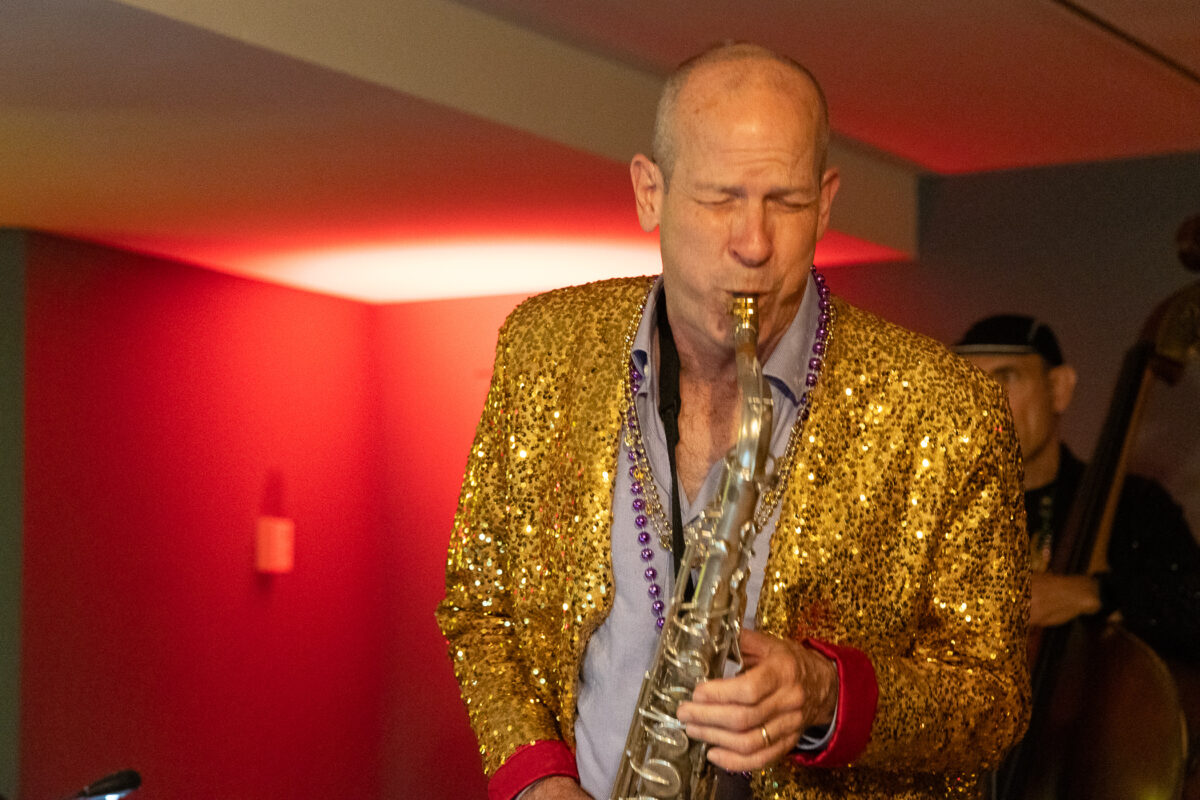
Band Member Bios: Tom Hall
Tom Hall has toured throughout the US and Europe performing and recording in a wide variety of musical styles, with bands such as The Bruce Katz Band, Club d’Elf, Bob Nieske’s Wolf Soup, Revolutionary Snake Ensemble, and Your Neighborhood Saxophone Quartet (of which he is a founding member). Hall has appeared on over 30 CD’s and has played at many festivals like The Boston Globe Jazz Festival, Moers Music Festival (Germany), Bang on a Can New Music Festival (NYC). Nottendon Blues Festival (Norway), and Mellon Jazz Festival (Philadelphia). He has collaborated with a wide variety of musicians, including John Medeski, D.J. Logic, Reeves Gabrels, Joe Maneri, Dave Tronzo, and Jacques Morelenbaum. He is an instructor at Brandeis University and MIT, and is the author of “Free Improvisation: A Practical Guide”. Hall is the host and creator of ImprovLive 365.
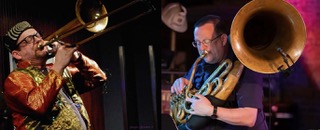
Band Member Bios: Dave Harris
David Harris has distinguished himself on trombone, tuba, and as a composer/arranger in
a multitude of musical styles. David is longtime trombonist and composer/arranger for the
avant gaarde big band Jazz Composers’ Alliance, most recently performing, composing,
conducting and producing their newest release “The JCA Orchestra Live at the BPC”. David has
been featured in soundtracks for TV, commercials, Woody Allen’s “Deconstructing Harry”, a
klezmer soundtrack for the movie “Stranger Among Us”, the soundtrack for the movie
“Opposite of Sex,” as well as recording on over 50 albums of jazz, klezmer, and world music.
David has performed in the US, Canada, and Africa with the Ethiopian funk band Debo Band,
recording on their debut album on the Sub Pop label, as well as recording his composition “Trek
from Ethiopia” for the Trikont label compilation “Beyond Addis”. David’s most recent projects
include TNT, performing instrumental versions of groove soul and funk tunes from the 1960’s
and 70’s. Mr. Harris has performed around the world, including the Berlin Jazz Festival,
Montreal Jazz Festival, the Sauti za Busara in Zanzibar, Carnegie Hall, Lincoln Center, the
Philadelphia Pops, the Kennedy Center, and jazz clubs such as the Blue Note, Tonic, and the
Knitting Factory. As a jazz composer, he has won the Massachusetts Cultural Council
Fellowship for music composition 3 times. Mr. Harris is also a full professor at Berklee College
of Music in the Harmony department.
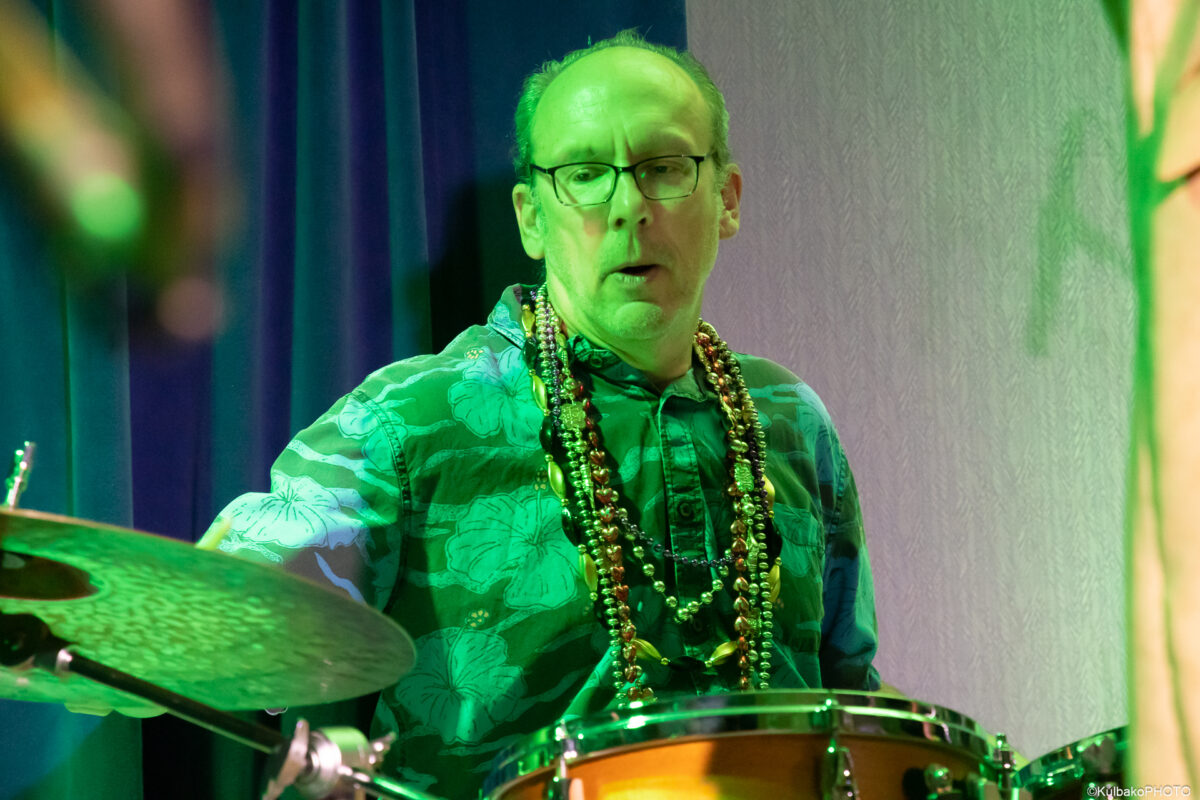
Band Member Bios: Phil Neighbors
Phil Neighbors has been playing music since his teens where he gained experience playing in shows, Dixieland groups, and German bands. Phil studied Percussion, Jazz, and Composition at Morehead State University in Kentucky. Since then, Phil has played with a host of different bands in many genres both in Cincinnati and in Boston. Since moving to Boston in 1995, he has performed and/or recorded with groups as diverse as: The Revolutionary Snake Ensemble, Dave Birkin’s Hot Shots, the Sam Davis group, The Coots, the Jeff Robinson Trio, and the Funky White Honkies.
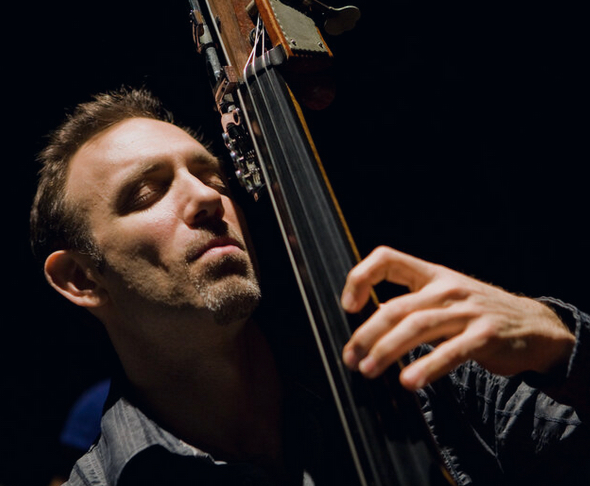
Band Member Bios: Blake Newman
Bassist in productions at the American Repertory Theatre: Oedipus (dir. Robert
Woodruff), OrpheusX (dir. Woodruff), Julius Ceasar (dir. Arthur Nauzyciel), Has
played at the Edinburgh Int. Festival, Hong Kong Int. Festival of the Arts, Festival
d’automne à Paris, Festival Iberoamericano Bogotá, Theatre For a New
Audience. Performed in John Kelly’s Paved Paradise: the Music of Joni Mitchell
at Theater Offensive, Hammer Museum, Real Artways, Bard College, One World
Theatre. Performs and records with Gamelan Galak Tika, toured Bali, played
Carnegie Hall and Alice Tully Hall. Toured Senegal with Ibrahima Camara and
Safal, Composed score for play As If We Live To Bear No Scars. Leader of Blake
Newman Group, bassist with Jeff Robinson Trio, Revolutionary Snake Ensemble.
Has performed and/or recorded with Evan Ziporyn, Quincy Troupe. David
Murray, Ran Blake, Amiri Baraka, Big Jack Johnson, Duke Robillard, Patricia
Smith, John Sinclair, Iva Bittova, Butch Morris, Jon Faddis, Bruce Katz, Charles
Neville.
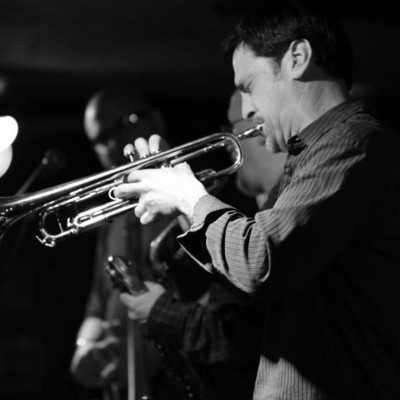
Band Member Bios: Jerry Sabatini
For the past twenty five years Jerry Sabatini has been performing and recording with many of the New England’s most innovative bands including, The Makanda Project, Garrison Fewell’s Variable Density Orchestra, Mehmet Sanlikol’s Dunya, The Revolutionary Snake Ensemble, Charlie Kohlhase’s Explorers Club, Eric Hofbauer’s Prehistoric Jazz ensemble, The Boston Jazz Composer’s Alliance, and the Mark Marquis Group. He has also shared the stage with some of the world’s greatest internationally known musicians and composers such as Oliver Lake, John Tchicai, Charles Neville, Fred Frith, Elliot Sharp, Anthony Coleman, Joe Ford, Odean Pope, and Erkan Oğur.
Jerry holds a Masters degree in Contemporary Improvisation (formerly known as “Third Stream Music”) from the New England Conservatory of Music in Boston, MA. There he studied improvisation, personal style, ear training and experimental with Ran Blake and Anthony Coleman, jazz composition with Frank Carlberg, classical trumpet with Charles Schlueter; North Indian classical music and ethnomusicology with Peter Row, and brain development and learning with Lyle Davidson.
In 2007, Jerry was recognized as a finalist in the Massachusetts Cultural Commission’s Music Composition Awards for his quintet works for his group the Sonic Explorers’ 2007 release, Lore of the Land. He has been commissioned for modern big band and jazz combo works by Longy School of Music in Cambridge, MA, Worcester Polytechnic Institute, the Massachusetts Music Educators Association, Lunenburg Public High School, The Joy of Music Program in Worcester, MA, and the Tahanto Regional High School in Bolyston, MA.
Jerry teaches privately from his home studio in Leominster, MA, directs an adult jazz big band at Indian Hill Music School in Littleton, MA, jazz combos at The Joy of Music Program in Worcester, MA, as well as teaches jazz ensemble and jazz history classes at Cushing Academy in Ashburnham, MA. He is a frequent guest clinician and conductor for college, university and high school jazz ensembles, and has developed a week-long jazz theory, style and improvisation program that he runs the summer months.
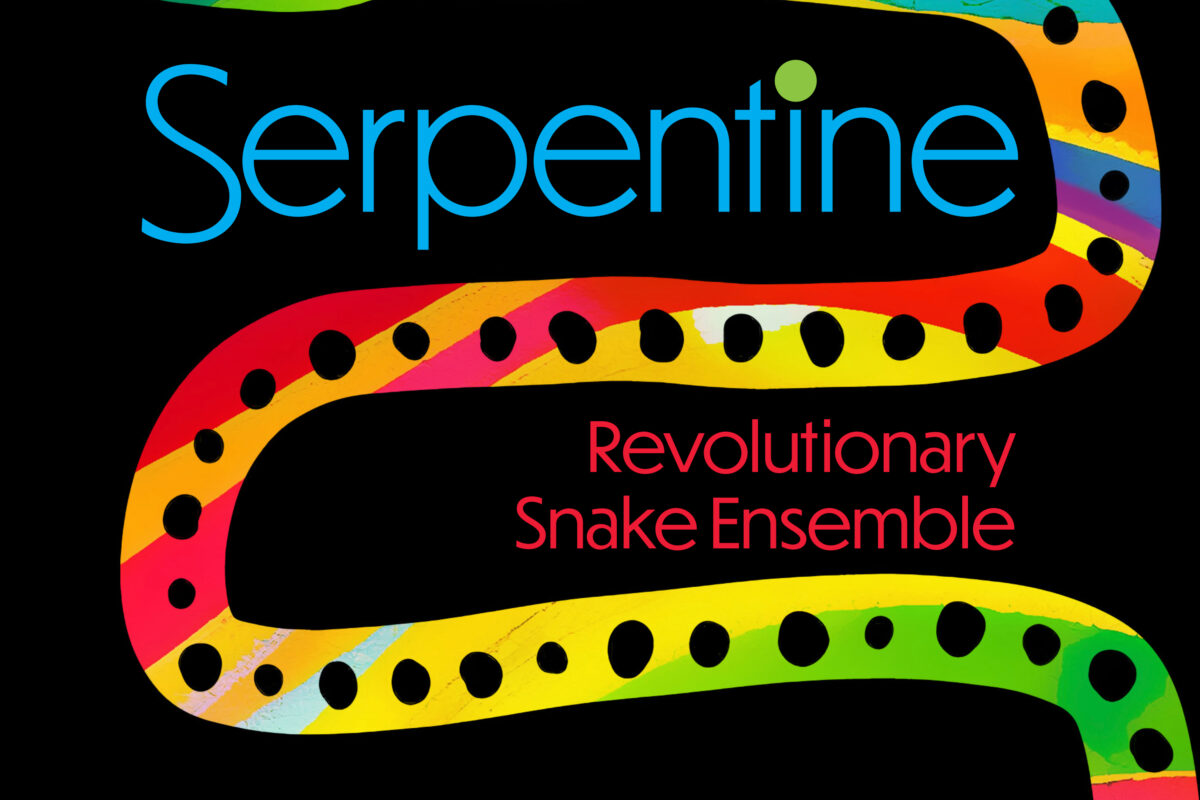
History: "Serpentine" (Cuneiform Records, 2025)
Revolutionary Snake Ensemble delivers another blast of brass-powered jazz, funk and New Orleans street rhythms with the blazing live album Serpentine!
The ouroboros, a serpent swallowing its own tail, is an ancient symbol of infinity and the cyclical nature of life, death, and rebirth. The omnivorous Revolutionary Snake Ensemble isn’t quite eternal, but the brass-powered Boston combo devoirs and reinvents a panoply of irresistible grooves, and with Serpentine the sextet is poised to gracefully undulate into its fifth decade. RSE’s fifth album is a joyously uproarious live session recorded in 2024 at the Regattabar as part of the group’s 35th anniversary run.
Led by inveterately inventive alto saxophonist, flutist, and composer Ken Field, the RSE is a musical insurrection with enviable longevity. As NYC Jazz Record noted, the group has earned a devoted following with “its unique and somewhat twisted twist on the New Orleans brass band tradition…hard-partying avant-funk, with boisterous soloing.” Almost a decade after the release of the band’s last album, 2016’s critically hailed I Want That Sound!, the group boasts the same potent line up, with Dave Harris on trombone and tuba, tenor saxophonist Tom Hall, bassist Blake Newman, trumpeter Jerry Sabatini, and drummer Phil Neighbors, “whom I’ve been playing with the longest – he’s an amazing drummer,” Field says.
“The concept of not having a chording instrument in the band allows for tremendous freedom on the part of the horn players. The arrangements are usually spontaneous, decided by me on stage based on the group vibe and on my vibe at the moment!”
Spirits were obviously high at the Regattabar, one of the Boston area’s leading jazz venues. The RSE sounds loose and limber, delivering one thrilling piece after another, enviably undaunted by the prospect of making a new album with Field changing up arrangements on the spot. “I told the guys, ‘Don’t worry about the fact that we’re recording,’” Field says. “‘Don’t hold back. Take chances.’ Jazz is an experimental form. If you do the same thing every night you’re not doing jazz right, in my opinion.”
For longtime fans of the RSE, Serpentine is a welcome dispatch from the frontiers of New Orleans-inspired funk, and for newcomers it’s an invitation to expand your rhythmic consciousness. As New Orleans Jazz Museum curator and longtime WWOZ host of “Freaknologist Lunatique” David Kunian declared, “All hail the mighty Revolutionary Snake Ensemble. They have blessed us with another great record of jazz that you have to dance to, but without losing the complexity and sophistication of the music itself. There’s some Sun Ra, some New Orleans second line, some Afrobeat, some Zappa, and other mystical ingredients that combine into a musical spell that will envelop the listener. This is jazz for young and old and new and veteran.”
The album opens with “The Skunk is D’Funk’d,” a furiously grooving piece that Field originally conceived for the Good Trouble Brass Band, a politically-charged community combo that has provided an incendiary soundtrack for Boston-area protests since the 1980s. At a Martha’s Vineyard gathering the group encountered “a skunk that was defunct,” which Field says inspired the tune’s particularly potent funk. “We also do this with an 80-100 person pick-up band I lead in Australia at the HONK!Oz Festival” he says. “It works really well with a large group and also scales down. I like writing material that’s simple in terms of construction, with two or three sections, bass and melody lines, and not a lot of chord changes. Both less is more and more is more.”
This seemingly contradictory aesthetic makes perfect sense in the RSE, which provides elemental pleasures via dance-inspired syncopation. In the case of “Buck,” Field rides the serpent into Balkan territory, a satisfying detour for the Crescent City-steeped band. The reverent arrangement of the folk song “The Water is Wide” serves as a balladic deep breath, with a hymn-like rendition featuring a series of striking solos by Sabatini and Harris. From the beatific to the boisterous, Field revamped his solo sax piece “Berrendo” for the group as “Berrendo Road,” complete with capricious melody and bounding bass line delivered with Newman’s typical agility.
While “Berrendo” was originally created during a residency in a subterranean space, “Strange Cults” plumbs the depths of human experience with a descending melodic line that Field wrote back in the 1970s when Rev. Jim Jones and the People’s Temple were in the news. Which isn’t to say he gravitates to human folly. With “Nezalezhnist” (the Ukrainian word for independence), Field wrote a minor-key anthem that evokes the strength and fortitude of a people fighting for survival. And with an affectionate cover of Frank Zappa’s “Son of Mr. Green Genes” (from the 1969 album Hot Rats), the RSE soars through a very different kind of fanfare, grandiose, witty, and ready to rumble, with a beautifully authoritative, wide ranging, and exploratory solo from Hall on tenor sax.
“Present” is a quintessential Field piece, with graceful harmonic motion defined by lapidary lines, and beautifully calibrated interlocking parts. His solo is a master class in maintaining intensity with supple dynamics and slippery phrasing. He displays his command of the flute on “Xonk,” a minimalist tour de force co-written with the Hungry March Band’s Jason Chandler. The album closes with a second-line setting of James Cleveland’s gospel standard “Never Grow Old,” a respectful hat tip “in recognition of where the band is coming from,” Field says. “We’re still focused on New Orleans second-line music. It’s a triumvirate of elements, New Orleans, free improvisation, and funk.”
Born January 26, 1953 in Red Bank, New Jersey, Field grew up next door to a club frequented by Bruce Springsteen in his early days with the trio Earth (he didn’t find out about his hometown’s most famous native son, William “Count” Basie, until much later). Starting on clarinet at 10, he made quick progress, playing in marching band and orchestra, and put in some extracurricular time on tenor sax in a high school rock band. An accident his freshman year at Brown University knocked out his front tooth, which brought his clarinet playing to an immediate end. Turning his attention to the flute, Field started to teach himself to improvise while managing the Providence folk/blues venue Big Mother Coffee House. While studying applied mathematics, he fell in with some local musicians who introduced him to innovators like Coltrane, McCoy Tyner, Weather Report, and Frank Zappa. “I started jamming with them on flute, and it was a whole educational thing for me, being exposed to all this great music,” Field says.
Working as a computer programmer, he turned his attention to the alto sax, and started commuting to Boston to study with legendary teacher Joe Viola. Eventually he took time off from his day job to attend Berklee from 1977-79, which led to his move to Boston. He spent several years playing with the psychedelic funk band Skin, and ended up replacing saxophonist Steve Adams (who was moving to the Bay Area to join ROVA Saxophone Quartet) in Birdsongs of Mesozoic, a new music/chamber rock ensemble that spun off from the storied band Mission of Burma.
“That was a transformative experience,” Field says. “Birdsongs is an avant rock band that’s compositionally based. I learned a lot from all those guys, pushing all kinds of musical limits.”
Field continues as a member of Birdsongs, while also maintaining a busy solo career as a player and composer with a half dozen solo releases, including Subterranea (O.O.Discs), Pictures of Motion (sFz), Tokyo in F (Sublingual), Under the Skin (Innova), Iridescence (Ravello Records), and Transmitter (Neuma Recordings). Field has written scores for animation, film, modern dance, and television, including music for Sesame Street.
But it’s in the RSE that he truly lets his freak flag fly. Decked out in feathered and metallic finery that evokes Sun Ra’s Arkestra as much as the Mardi Gras Indians, the RSE has always honored the essential role of New Orleans brass bands in providing succor and uplift to mourners accompanying loved ones for burial (while also fulfilling the celebratory imperative for the promenade back from the cemetery). He founded the group in 1990 when he assembled an improvisational horn and percussion group with trumpeter and cartoonist Scott Getchell for a pagan women’s ritual celebration. The response was so positive that he decided to continue the project as a vehicle for the region’s skilled free improv set. But as Getchell moved on to other projects, Field gradually developed a book featuring his originals and rarely played tunes by John Scofield, Sun Ra, and Ornette Coleman set to New Orleans street grooves.
Part workshop and part improvisors’ clinic, the band attracted a revolving cast of players. “The material was very improvisational and the arrangements tended to be spontaneous,” Field says. “I’d direct on the spot, which started as a very stressful role. Over time I learned a lot about how to do that and it’s still the way the band works.” The result was a moveable music feast from which everyone wanted to partake. “The late NOLA sax player Charles Neville joined us for a number of years for our annual Mardi Gras concert, as did the late NOLA sax player Amadee Castenell,” Field notes. “Drummer Kenny Wollesen and sax player Matt Darriau played with us in New York City when some of my band members couldn’t make the trip from Boston due to a snowstorm, and they ended up on Live Snakes, along with New York trombonist Josh Roseman. Trumpeter Jason Palmer, sax player Godwin Louis, and drummer Brian Richburg Jr. have guested with us at various times. And Troy “Trombone Shorty” Andrews was our guest soloist at a performance at Boston’s Museum of Fine Arts.”
The regular Snake ranks have been equally formidable. Over the years, the RSE has featured a host of stellar musicians, including saxophonists Russ Gershon (Either/Orchestra), Dana Colley (Morphine), Charlie Kohlhase (John Tchicai/Leroy Jenkins/Anthony Braxton), Noah Preminger, and Gregory Groover Jr., bassists Jesse Williams (Al Kooper/Duke Robillard), Kimon Kirk (Aimee Mann, Session Americana), and Jim Prescott (G Love & Special Sauce), trumpeter Scott Getchell (Lars Vegas, Skull Session), trombonists Scott Flynn, Bob Pilkington (Chandler Travis Philharmonic) and the late Danny Heath, percussionist Ken Winokur (Alloy Orchestra), and drummers Eric Paull (DJ Logic, Clem Snide), Lee Fish, Matt Williams, and the late Stanley Swann.
The band’s acclaimed debut album, 2003’s Year of the Snake (Innova Recordings), brought national attention. The following year the RSE began playing regularly at Mardi Gras in New Orleans, a sojourn made possible by a singular arrangement with Amtrak’s Crescent train in which the band performing their music en route. On arrival, the Snake Ensemble regularly marched with the all-women Krewe of Muses, an experience that “legitimized the band to me,” Field says.
“We would get down there, play a little party, and people assumed we were from New Orleans, and that meant a lot to us. At the same time, we were doing something different. It gave us the experience of meeting and playing with some New Orleans musicians, and they always encouraged us to keep doing our own thing.”
With its second album, 2008’s Forked Tongue (Cuneiform), the RSE continued to expand its already far-flung repertoire, ranging from hymns and spirituals to traditional New Orleans parade anthems and tunes by everyone from Billy Idol to Ornette Coleman. The group first unleashed its fierce concert energy on 2014’s Live Snakes. Serpentine marks yet another shedding of skin, offering a further glimpse into the RSE’s improvisational brio and gritty splendor.
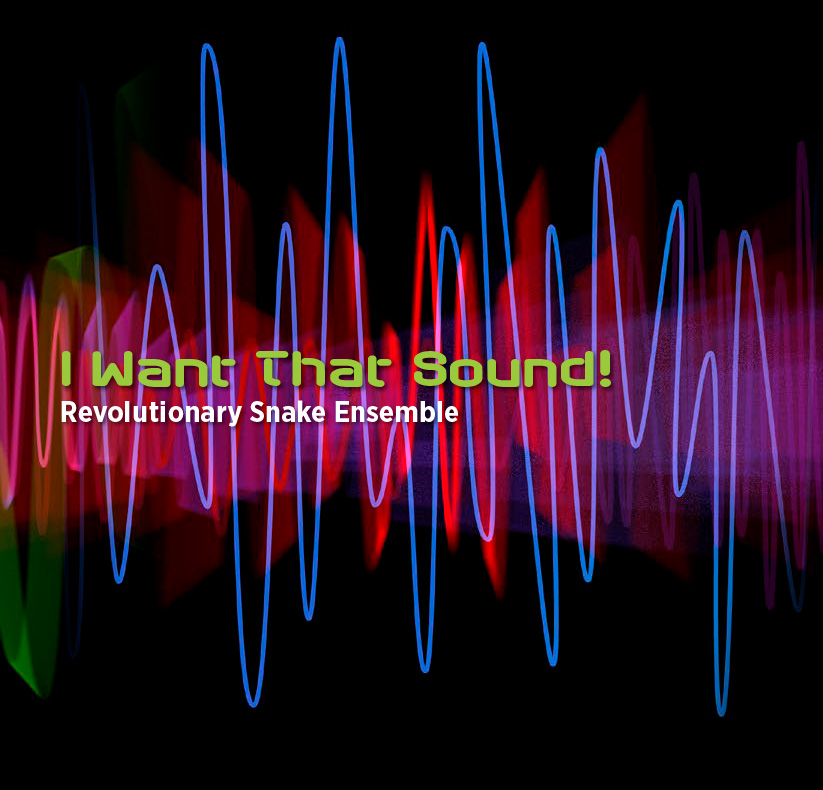
History: "I Want That Sound!" (Innova Recordings, 2016)
Labeled “explosive” by the Boston Globe, two-time New England Music Award nominees Revolutionary Snake Ensemble’s 2016 cd I Want That Sound! received extensive critical acclaim, and entered the CMJ jazz radio top ten chart just two weeks after its release.
NYC Jazz Record wrote that “Revolutionary Snake Ensemble has been putting its unique and somewhat twisted twist on the New Orleans brass band tradition for more than 25 years…hard-partying avant-funk, with boisterous soloing…I Want That Sound! is a strong example of how Ken Field and the Revolutionary Snake Ensemble continue to push the brass band tradition forward in an entirely original way, all the while making music that’s a heck of a lot of fun.”
KBCS Seattle Public Radio said that RSE “continues to mine the vein of New Orleans – with post-bop, and touches of Avant – this band cooks; edgy, raucous, fun, and first rate!”
And the Boston Herald added that “People tend to think of second line bands – brass bands steeped in New Orleans traditions – as instant party starters. It’s a great compliment, maybe the best compliment ever, but it limits the sonic and emotional range of these bands. Revolutionary Snake Ensemble can absolutely get a party started. But on the local horn collective’s fourth album, I Want That Sound!, the players also explore the wild outerlands of jazz.
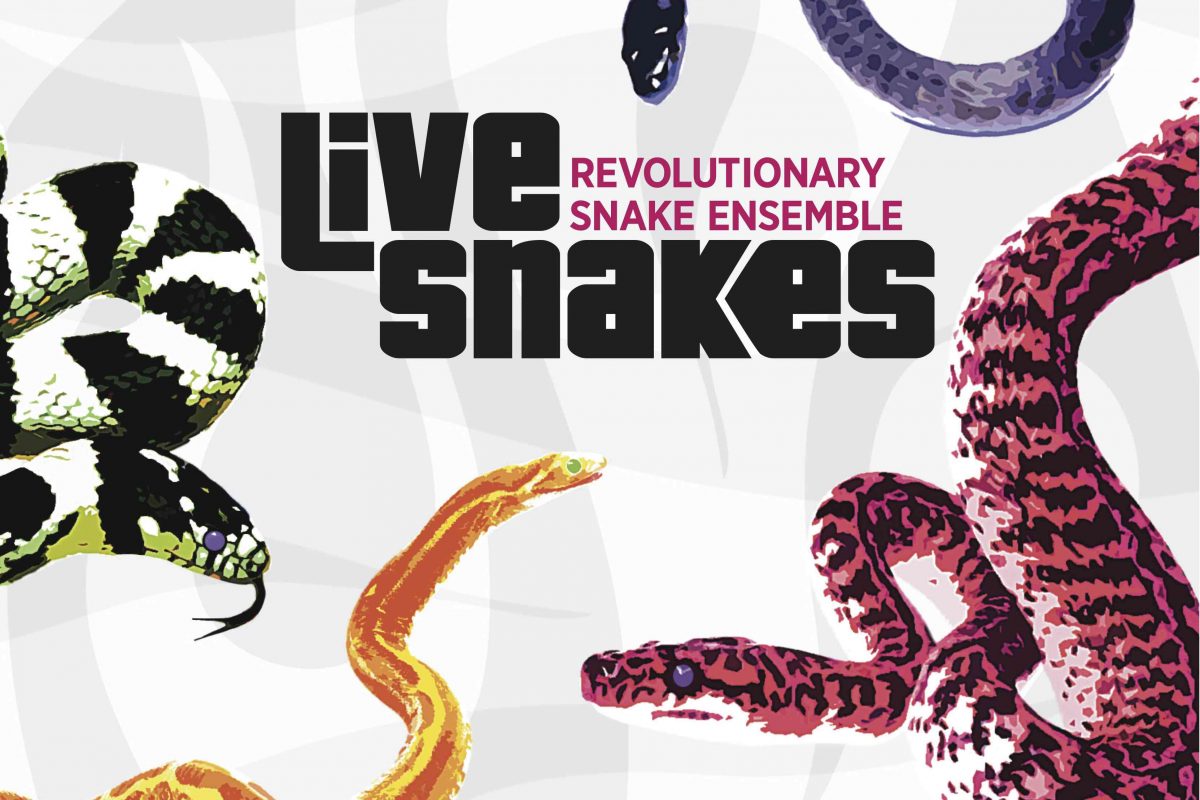
Their 3rd release, Live Snakes (Accurate 2014), was recorded in 2011 & 2013 in Boston, Brooklyn, and Manhattan, and documents four distinct incarnations of the ensemble, with two remixes by Field, and with guest musicians including Charles Neville, Josh Roseman, Kenny Wollesen, and Matt Darriau. With sold out CD release performances at Boston’s Regattabar, at Barbes in NYC, and at Kennedy Center in Washington, D.C., the CD broke into the top 10 on the CMJ jazz chart in its 2nd week out, and was an Editor’s Pick in Downbeat Magazine.
The group’s 2nd CD, Forked Tongue (2008), spent 2 months on the CMJ North American jazz top 20 chart, peaking at #11, and appeared on best-of-2008 lists in the Village Voice & in Estonia, plus in Georgia, Wisconsin, Kansas, Michigan, Massachusetts, Ohio, and NY. The disc features unique treatments of music by Field, Ornette Coleman, Billy Idol, and others.
Notable Revolutionary Snake Ensemble performances have included the Krewe of Muses Mardi Gras Parade (New Orleans); Kennedy Center for the Performing Arts; Festival of Redentore (Venice, Italy); UFO Festival (Roswell, NM); Tonic (NYC); the Museum of Fine Arts (Boston); the Brooklyn Academy of Music; the Puffin Cultural Forum; Tipitina’s (New Orleans); Berklee Performance Center; the Somerville Theater; First Nights Boston, Providence, Fall River; the Cambridge River Festival; ArtBeat; the Central Square World’s Fair; and other venues.
From 2005-2009 the Snake Ensemble traveled by train five times from Boston to New Orleans, playing on board the Amtrak Crescent, to march with the Krewe of Muses in their annual Mardi Gras parade. The Ensemble can be heard on Parade of Numbers, an animated counting piece regularly aired on the television program Sesame Street.
RSE’s debut release, Year of the Snake (2003), included music by Field, Sun Ra, John Scofield, James Brown, and others, and was listed as one of the top discs of the year on New York NPR affiliate WNYC, in the New Orleans Gambit Weekly, and on Radio Popolare in Milan, Italy.
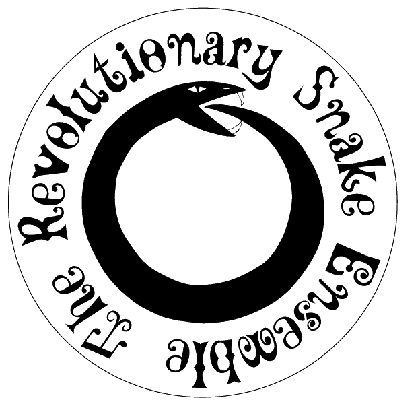
History: "Live Snakes" (Accurate Records, 2014)
Saxophonist/composer Ken Field‘s Revolutionary Snake Ensemble is on the march, spreading the gospel of groove far and near. Using the raucous rhythms of the New Orleans brass tradition as a launching pad, the Boston band has forged a volatile and unbridled sound that’s captured in all of its expressive glory on its third album, Live Snakes (Accurate Records).
Recorded in 2011 and 2013 in Boston, Brooklyn, and Manhattan, the album documents four distinct incarnations of the highly mutable ensemble, with two sonically inventive remixes by Field thrown in for good measure. Adding to the deep pool of Boston talent that has sustained the RSE for more than two decades, Live Snakes features an extended family of players, including New Orleans tenor saxophone great Charles Neville and New York masters Josh Roseman (trombone), Kenny Wollesen (drums and percussion), and Matt Darriau (tenor sax and flute).
Decked out in feathered and metallic finery that evokes Sun Ra’s Arkestra as much as the Mardi Gras Indians, the RSE has always honored the essential role of New Orleans brass bands in providing succor and uplift to mourners accompanying loved ones for burial (while also fulfilling the celebratory imperative for the promenade back from the cemetery). A good deal of Live Snakes’ emotional punch stems from the fact that Field’s wife, the renowned filmmaker and animator Karen Aqua who often collaborated with the RSE, lost her battle against cancer just two weeks after the album’s earliest session in 2011.
The whole New Orleans concept of a jazz funeral, where it’s very somber and moving at the beginning and then you break into celebratory uptempo grooves afterwards, really helped shape this album,” Field says. “After playing in churches and at Karen’s memorial it really brought home again that that’s the script for how music should be. You’re mourning and you’re celebrating. The music encompasses these really conflicting emotions, joy and sadness at the same time.
The heart of Live Snakes is the aching dirge “For Karen,” a stunning group improvisation from the 2011 session at Brooklyn’s 58 Northsix Media Labs in which Field’s bandmates join his raw but self-possessed cri de coeur. The lamentation segues seamlessly into a lugubrious rendition of the spiritual “I’ll Fly Away” recorded by a full eight-piece band two years later at Cambridge’s Regattabar, a performance that ends uptempo as a high-stepping celebration. The entire album’s sequencing follows this kind of emotional rather than temporal logic, imbuing Live Snakes with the feel of a cathartic and epiphany-filled odyssey.
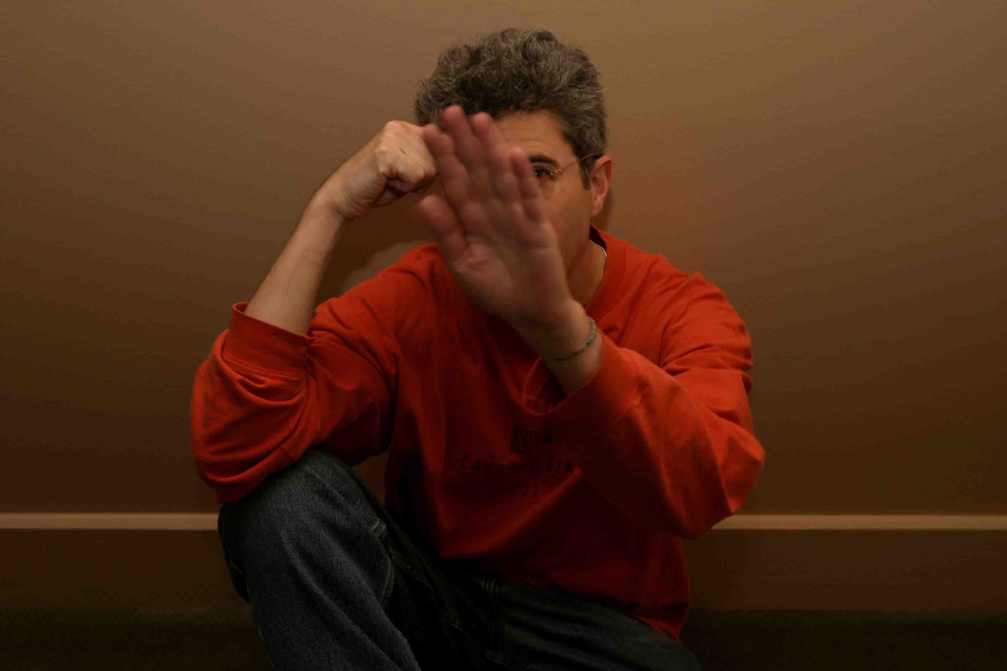
Opening with an ecstatic blast, Field welcomes listeners with “Parade,” an infectiously kinetic piece of lapidary Crescent City funk that makes it clear why the RSE has long been an honored presence at Mardi Gras. It’s a minimalist quintet version of the band powered by Wollesen and drummer Phil Neighbors’s brilliant rhythm section interplay, a polyrhythmic swirl that also inspires Field and Darriau’s tag-team horn work on “Slots” and the inventively grooving “I Got It.”
Marked by wicked irony, bawdy humor, seat-of-the-pants arrangements, and a love of unabashedly beautiful melodies, the band is equally effective interpreting hymns, like Thomas Hastings’s “Rock of Ages,” and jazz standards, such as Juan Tizol’s Ellingtonian classic “Caravan,” which gets a torrid treatment. In a performance that brings to mind Lester Bowie’s Brass Fantasy, the RSE digs into the 1950s pop hit “Que Sera Sera” with style and aplomb. Field closes the album with an atmospheric remix of “Cassandra 4,” a tune originally commissioned by Bridgeman/Packer Dance, and a newly constructed piece “Breakdown Part One” that can best be described as Miles Runs the Voodoo Down to Basin Street. In a typically Fieldian move, he turns a live album into an opportunity for further investigation into form and texture.
“I’m a firm believer in experimentation: I don’t like doing the same thing twice or repeating what other people have done,” Field says. “But at the same time I like the idea of maintaining some continuity with what listeners expect, so when we’re rhythmically complex sometimes we’ll be harmonically simpler. I play a melodic instrument, so we’re always going to be focusing on melodically based music.”
Field founded the Revolutionary Snake Ensemble in 1990 when he assembled an improvisational horn and percussion group with trumpeter and cartoonist Scott Getchell for a pagan women’s ritual celebration. The response was so positive that he decided to continue the project as a vehicle for the region’s skilled free improv set. But as Getchell moved on to other projects, Field gradually developed a book featuring his originals and rarely played tunes by John Scofield, Sun Ra, and Ornette Coleman set to funky New Orleans marching grooves.
Part workshop and part improvisers’ clinic, the band attracted a revolving cast of players. “The material was very improvisational and the arrangements tended to be spontaneous,” Field says. “I’d direct on the spot, which started as a very stressful role. Over time I learned a lot about how to do that, and it’s still the way the band works.”
Over the years, the RSE has featured a host of stellar musicians, including Dana Colley (Morphine), Jesse Williams (Al Kooper/Duke Robillard), Russ Gershon (Either/Orchestra), Eric Paull (DJ Logic, Clem Snide), Ken Winokur (Alloy Orchestra), Charlie Kohlhase (John Tchicai/Leroy Jenkins/Anthony Braxton), Jim Prescott (G Love & Special Sauce), Kimon Kirk (Aimee Mann, Session Americana), Scott Getchell (Lars Vegas, Skull Session), Dave Harris (Naftule’s Dream, Les Miserables Brass Band), and Bob Pilkington (Chandler Travis Philharmonic).
The band’s acclaimed debut album, 2003’s Year of the Snake (Innova Recordings), brought national attention. The following year the RSE began playing regularly at Mardi Gras, a sojourn made possible by a singular arrangement with Amtrak’s Crescent train in which the band performed their music en route to New Orleans. On arrival, the Snake Ensemble has regularly marched with the all-women Krewe of Muses, an experience that “legitimized the band to me,” Field says.
We would get down there, play a little party, and people assumed we were from New Orleans, and that meant a lot to us. At the same time, we were doing something different. It gave us the experience of meeting and playing with some New Orleans musicians, and they always encouraged us to keep doing our own thing.
With its second album, 2008’s Forked Tongue (Cuneiform), the RSE continued to expand its already far-flung repertoire, ranging from hymns and spirituals to traditional New Orleans parade anthems and tunes by everyone from Billy Idol to Ornette Coleman. With Live Snakes, the revolution continues to advance, revealing that this is one insurrection best experienced in the flesh.
Born in Red Bank, New Jersey, Field grew up next door to a club frequented by Bruce Springsteen in his early days with Earth (he didn’t find out about his hometown’s most famous native son, William “Count” Basie, until much later). Starting on clarinet at 10, Field made quick progress, playing in marching band and orchestra, and put in some extracurricular time on tenor sax in a high school rock band.
An accident his freshman year at Brown University knocked out one of his front teeth, which brought his clarinet playing to an immediate end. Turning his attention to the flute, Field started to teach himself to improvise while managing the Providence folk and blues venue Big Mother Coffee House. While studying applied mathematics, he fell in with some local musicians who introduced him to innovators like Coltrane, McCoy Tyner, Weather Report, and Frank Zappa.
“I started jamming with them on flute, and it was a whole educational thing for me, being exposed to all this music I really didn’t know,” Field says.
Working as a computer scientist, he turned his attention to the alto sax, and started commuting to Boston to study with noted teacher Joe Viola. Eventually he took time off from his day job to attend Berklee from 1977 to 1979, which led to his move to Boston. He spent several years playing with the psychedelic funk band Skin, and ended up replacing saxophonist Steve Adams (who was moving to the Bay Area to join Rova Saxophone Quartet) in Birdsongs of Mesozoic, a new music/chamber rock ensemble that spun off from the storied band Mission of Burma.
That was a transformative experience,” Field says. “Birdsongs is an avant rock band that’s compositionally based. I learned a lot from those guys, pushing all kinds of musical limits.
Field continues to perform and record with Birdsongs, while also maintaining a busy solo career as a player and composer with five solo releases, including Subterranea (O.O.Discs), Pictures of Motion (sFz), Tokyo in F (Sublingual), Under the Skin (Innova), and Sensorium: Music For Dance & Film (Innova). Field has written scores for animation, film, modern dance, and television, including music for Sesame Street.
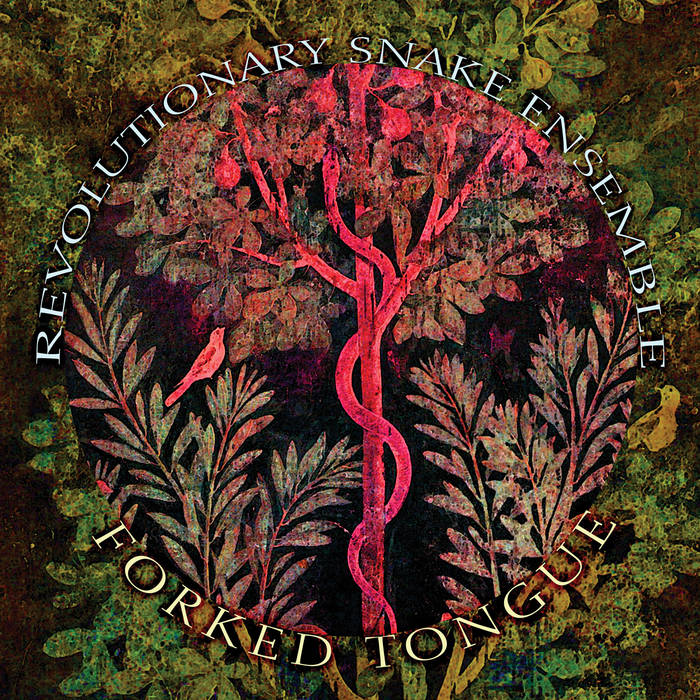
History: "Forked Tongue" (Cuneiform Records, 2008)
Dressed a la Mardi Gras in feathered masks and multi-colored, sequined costumes, playing music that riotously combines the rhythms of New Orleans brass bands with improvisation and heaping undercurrents of funk, the Revolutionary Snake Ensemble inhabits that rare musical planet on which Sun Ra, James Brown, George Clinton & Parliament Funkadelic, and a myriad of New Orleans marching bands jointly reside. Based physically in Boston since forming in 1990, the horn and percussion-based group is led by saxophonist/composer Ken Field, who describes it as “a funk and street beat brass band, playing New Orleans and other modern improvised celebratory styles.” The Snake’s music is rooted in the New Orleans tradition of jazz funerals – a tradition unique to the birthplace of jazz – which began with a ‘first line’ procession to the burial ground, a brass band playing hymns in a funeral dirge. Afterwards, in an upbeat celebration of the deceased’s life, the musicians play up-tempo “second line” music for the now-partying mourners. Playing Field’s original compositions and rearrangements of traditional tunes, opening up new avenues for improvisation, the Revolutionary Snake Ensemble celebrates, expands, and transforms the brass band tradition – a tradition, in the wake of Hurricane Katrina, that is now in diaspora.
A saxophonist/ composer/ improviser, Ken Field is one of Boston’s most dedicated and versatile musicians. Since 1988, he has been a member of Birdsongs of the Mesozoic, a New Music/ chamber rock ensemble that began as a spinoff from the legendary Mission of Burma. Birdsongs has recorded seven internationally acclaimed CDs on Cuneiform Records, including the recent Extreme Spirituals, which features the bass/baritone of acclaimed African American vocalist Oral Moses. Field also has an active solo career. An improviser and composer of classical/New Music, he has performed internationally and released four solo discs [Subterranea (O.O.Discs), Pictures of Motion (sFz), Tokyo in F (Sublingual), and Under the Skin (Innova)]. Field has composed music for animation & film, for Bridgman/Packer Dance, and for television, including music for Sesame Street. As a performer, he has worked as a sideman with countless renowned reggae, funk, R&B, rock, jazz, and world beat artists – and performed for former President Bill Clinton. Field is also the long-standing host of The New Edge, a Boston-based weekly radio show featuring a broad range of creative instrumental music.
The Revolutionary Snake Ensemble was formed in 1990 when Field assembled an improvisational horn and percussion group with trumpeter and cartoonist Scott Getchell to entertain at a pagan women’s ritual celebration. Field decided to continue the project, conceiving it initially as an improvisational group rooted in Boston’s free jazz/ improv scene. But the group “soon started playing some of my original pieces, plus obscure music by John Scofield, Sun Ra, Ornette Coleman, and others, mostly with a New Orleans funky marching groove,” recalls Field. As New Orleans brass band and Mardi Gras music began playing ever-increasing roles in the band’s repertoire, the Revolutionary Snake Ensemble came into its own. Speaking of the Snake’s music as though it were a bowl of New Orleans gumbo, which begins with a classic roux, critic Dan Oullette noted that it “captures the abandon of a street parade while expanding its stylistic scope…it’s got the essential ingredients spiced with fresh flavors”. Performer Magazine noted that the band “may operate from the traditions of New Orleans music, but the boundaries are pushed wide open when they actually play. “We mostly play from ‘head’ charts, where everyone has the melody and chord changes in front of them. Since there’s no guitar or keyboard, the horns can not only solo, they “even alter the harmonies spontaneously,” Field said. “So there’s a lot of improvisation. I also conduct some of the arrangements live” For both the band and its audiences, notes Performer, “doing all of the high art ministrations of improvisation and having an audible party at the same time really is the best of both worlds.”
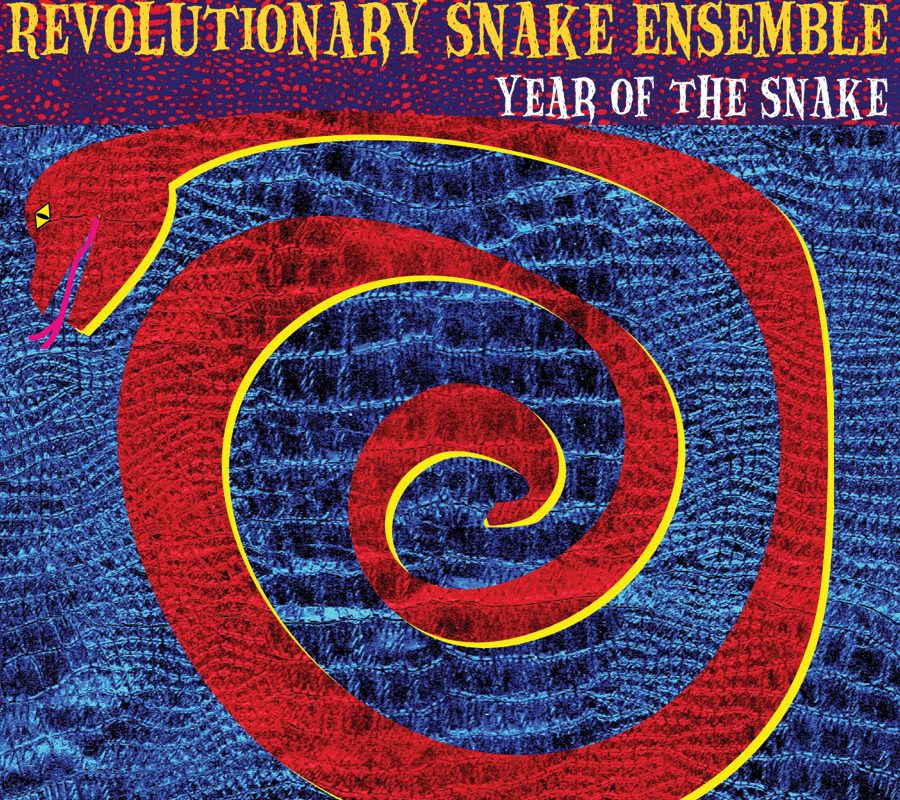
Combining their “booty-shaking and brain stimulating music” [Splendid] with over-the-top/outrageous costumes – feathered masks and sequined robes from a wardrobe shared by Mardi Gras and Sun Ra – the Revolutionary Snake Ensemble’s performances soon became one of Boston’s most-beloved ‘events’. They played everywhere in town – from private parties (they re-arranged a Billy Idol tune for a White family wedding) and clubs, to such revered institutions as Harvard, Tufts, and the Museum of Fine Arts. While usually averaging 7-8 members – two drummers, one or two bassists, and four horns – the ensemble’s lineup and size shifts over time and for specific events. Over the years, the Revolutionary Snake Ensemble “tribe” came from all corners of Boston’s music scene. Notable musicians who have performed as part of RSE through the years include Dana Colley (Morphine), Jesse Williams (Al Kooper, Duke Robillard), Russ Gershon (Either/Orchestra), Eric Paull (DJ Logic, Clem Snide), Ken Winokur (Alloy Orchestra), Charlie Kohlhase (John Tchicai, Leroy Jenkins, Anthony Braxton), Jim Prescott (G Love & Special Sauce), Kimon Kirk (Aimee Mann, Session Americana), Scott Getchell (Lars Vegas, Skull Session), Dave Harris (Naftule’s Dream, Les Miserables Brass Band), and Bob Pilkington (Chandler Travis Philharmonic). Repeatedly nominated in their Best Music Poll by the Boston Phoenix and WFNX Radio, the Revolutionary Snake Ensemble has been twice nominated by a panel of music writers and critics for a Boston Music Award.
In 2003, the Revolutionary Snake Ensemble released their first CD, Year of the Snake, on Innova Recordings. Recorded in 2002, it included music by Field as well as Sun Ra, John Scofield, James Brown, and others, with liner notes written by two-time Grammy-winning New Orleans music producer Scott Billington. It also included a track, “Parade”, originally recorded for an animated counting piece on Sesame Street, a widely-broadcast children’s television program. Year of the Snake brought the Revolutionary Snake Ensemble’s music to an international audience. Receiving considerable public, radio, and press acclaim, the studio recording was included on best-of-year lists from New York City’s NPR affiliate WNYC, the Gambit Weekly in New Orleans, and Radio Popolare in Milan, Italy. The first pressing sold out in two months. Revolutionary Snake Ensemble began taking their show on the road, accepting out of town gigs at NYC’s Tonic, the Brooklyn Academy of Music, the Puffin Cultural Forum, and the John F. Kennedy Center for the Performing Arts in Washington, DC. They also began taking their show on the rail. Beginning in 2004, in a unique arrangement with Amtrak, America’s national rail line, the Snakes began an annual pilgrimage to Mardis Gras on Amtrak’s Crescent train, performing their music en route. On arrival, the Snake Ensemble has marched yearly with the all-women Krewe of Muses in their New Orleans Mardi Gras parade. After Hurricane Katrina hit New Orleans on August 29, 2005, devastating the city where countless jazz artists made their homes, the Snakes’ pilgrimage assumed a more poignant note.
The Revolutionary Snake Ensemble’s 2nd release, Forked Tongue, is their first release on Cuneiform. In the New Orleans brass band tradition, Forked Tongue opens with a traditional New Orleans funeral dirge, “Just a Closer Walk”, before exploring more upbeat fare. Containing a total of 12 tunes, the disc showcases a wide range of the Snakes’ repertoire. It includes unique arrangements of traditional New Orleans marching music and spirituals and of music by such diverse songwriters as William Broad (aka Billy Idol), Ornette Colemen (this may be the first disc ever to feature music by both Idol and Coleman!), Norman Span, and Jay Livingston & Ray Evans, as well as original material by Field. The album features Field on alto sax, whistles and percussion; Andrew Hickman on tenor saxophone, Jon Fraser on trumpet, Lennie Peterson on trombone, Kimon Kirk on acoustic bass, and both Eric Paull and Phil Neighbors (who also contributes electric bass) on drums and percussion. Guest vocalist Gabrielle Agachicko performs Field’s stunning minor key arrangement of the traditional classic “Down By the Riverside.” Other guests include Karen Aqua (djembe, tambourine), Andy Pinkham (electric bass), and Jesse Williams (bass). Recorded in 2006 at Boston’s Mortal Music Studios by engineer/owner Andy Pinkham, it was remixed by Minneapolis’ Balanced Productions and mastered in Los Angeles by Bob Demaa.
Don't Miss the Revolution!
Get notifications about new releases and live shows announcements by joining our...
